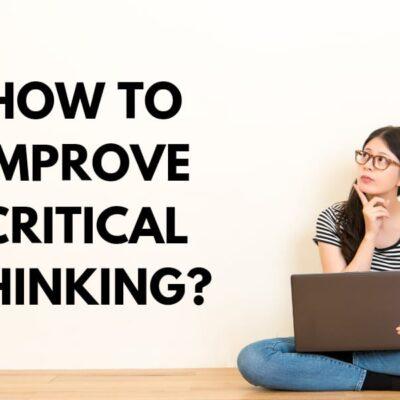How to improve critical thinking: The ability to analyze statements, evaluate evidence, and distinguish between fact and opinion is a useful skill. As a result, critical thinking is a highly sought-after capacity that can benefit you in your personal life and at work. But what is critical thinking and how do you think critically? We will talk about it in detail in this article.
What is critical thinking:
Does not matter where you look, you might find differences between definitions of critical thinking. Let us discuss this in simple language, critical thinking is the examination of real evidence to make a judgment.
However, a closer examination of the term and its meaning indicates that there are many factors to critical thinking. The root concept of critical thinking is also considered the process of thorough goal-directed thinking.
How to think critically:
If you want to test and avoid common barriers to critical thinking, there are several methods that you can use in formulating critical thinking skills. Below, we have summarized some of the steps you can take to examine statements, evaluate proof, and differentiate between fact and opinion.
Although the critical thinking process will differ between individuals, there are some practical steps:
Recognize the issue
When faced with a problem, determine what has caused it.
Also Read: How to find inspiration every day?
Examine the arguments
There are usually different sides to an argument, so it is necessary to understand who is saying what and how valid each point is.
Find the facts
It is important to separate the facts from the opinions and assess how accurately the evidence is given.
Question your biases
Ask yourself whether or not you are making beliefs, why you believe a certain point, and whether you are letting confirmation bias, structure, or common misconceptions impact your thinking.
Determine on significance
Each side of an argument may have supportive proof. Deciding which information is most critical, reasoned, valid, and has a sound premise will help decide the significance of each.
Draw judgments
The different steps above will guide you to decide which argument is the most accurate. You can also consider the strengths and weaknesses of all options.
How to improve critical thinking skills:
The steps above appear simple, yet with the various barriers and feelings involved in decision-making, it can periodically be hard to let your head rule above your heart. So how can you enhance your critical thinking skills?
There are different ways that you can gain the benefits of critical thinking, including.
Use scrutiny and skepticism
It demands a small effort to accept things at face value and accept what you are being told. However, doing so is not quite helpful for critical thinking. Instead, it would be best if you questioned what is in front of you, ask what the motivations are, and how valid the information is.
Remove the least useful and inconsistent information
It can be challenging to make effective decisions when you are covered by incorrect information. Using your critical eye and skepticism, you can start to overlook the bad arguments and biased claims.
Use reliable sources
When you are investigating a topic to make an informed decision, always pay attention to the origin. Take a look at evidence-based data from trustworthy sources and be careful of how data are delivered to you.
Listen carefully
Active listening is a technique that ensures the listener focuses, understands, reacts to, and remembers what is being said. It is also about observing body language and behavior. This type of active listening can help you completely understand what is being said and why, and what are the pros and cons of the argument.
Utilize empathy
Being able to understand another person allows you to understand their point of view, motives, and aspirations. While doing so, you are better able to appreciate why they hold a certain belief or think in a certain way.



